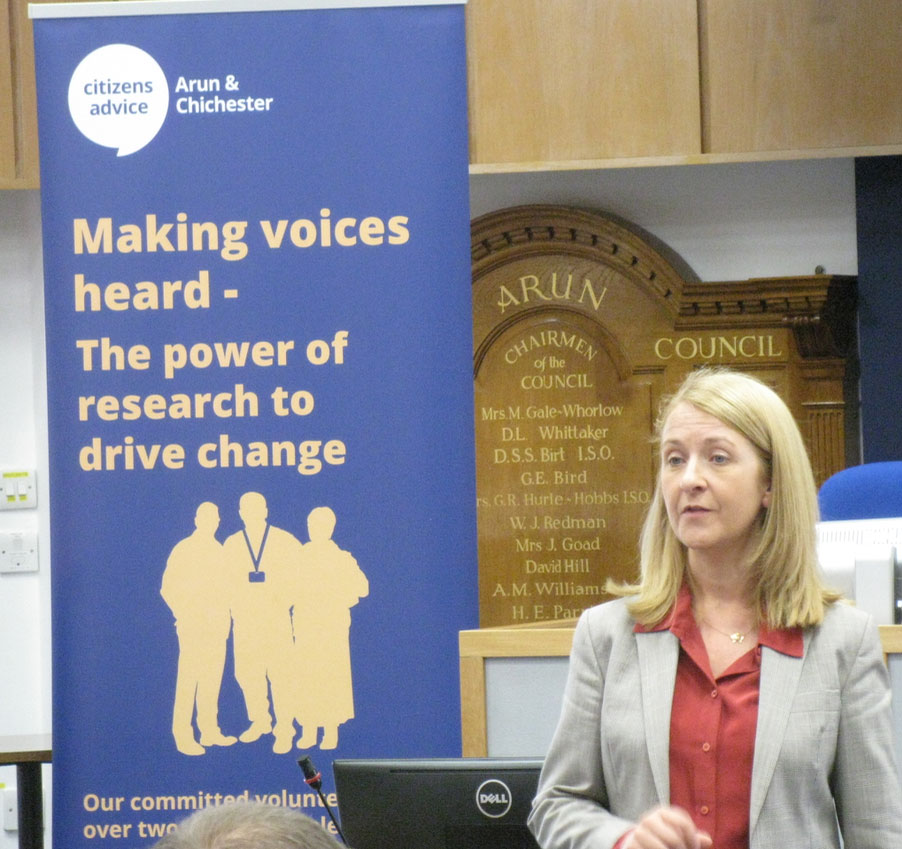Citizens Advice and West Sussex County Council come together to help vulnerable people to avoid fraudsters and scammers
We know that on average, more than half of scam victims live alone, and 60% are over the age of 75. Scammers often use cruel tactics to play on their victims’ emotions. Guests heard from Sally (not her real name), a local Sussex resident, who was the victim of a romance scam four years ago. Sally described how with one click she almost lost her family through lies, deceit and denial that she was the victim of a scam. Sally chose to share her story to help others be more careful.
Sally’s daughter explained that her family had only discovered what was going on when her mother was about to re-mortgage her house – and that the ramifications still have effects on the family four years later.
Sally concluded by saying that she almost lost her family through her lies, denial that she was being scammed and the deceit. It has taken a long time for her family to trust her again.
Sally’s experience is all too common – her experience is typical of the way serious crime organisations target people – she was living alone, recently bereaved, socially isolated and lonely. Fraud has evolved more dramatically than other crimes over recent years with the rise of technology, mobile devices, the internet, and the introduction of “plastic payment”. Such technology has not only facilitated new methods of committing traditional crimes, but has also created opportunity for new types of crime altogether, such as computer misuse and cyber-crime. Romance fraud has seen victims in the UK losing £41 million in total, and in the year 2016 individuals lost around £10 billion to online fraud. Guests heard from several high-profile speakers tackling scammers every day.
Debbie Kennard, West Sussex County Council Cabinet Member for Safer, Stronger Communities, said: “This was a really positive and successful event which will make a big difference when it comes to protecting our most vulnerable residents from scams.
“I would like to thank everyone who attended, particularly those who shared their experiences and stories.”
Katy Bourne, Sussex Police and Crime Commissioner, is a prominent supporter of Action on Elder Abuse. Mrs Bourne told guests that one in five older people in Sussex are more frightened of the phone ringing than of antisocial behaviour on the streets, and that the average financial loss from each individual scam in Sussex is £20,000. Mrs Bourne said that the more we talk about scams, the more people know about scams, the more people will report it and that was why she was “delighted to support this event”
Bernadette Lawrie, Sussex Police’s Financial Abuse Safeguarding Officer – winner of the National Police Chiefs’ Council Excellence in Fraud Policing Award – shared crime statistics for scams in Sussex. Bernadette explained that the biggest source of scams and fraud started with a telephone call, followed by rogue traders and many others.
Steve Smith, Founder and Director of trueCall and Queens Award winner for Enterprise and Innovation, shared with attendees the different methods of reducing nuisance telephone calls. trueCall work with more than 150 local authorities, police forces and Trading Standard organisations throughout the country. Steve explained that it is possible to achieve a 100% barring of nuisance calls, but typically 95% is easily achievable with technology.
Liz Stanton, Get Safe Online Senior Manager and Family Protection Advisor, warned guests that scammers don’t just work over the phone – they will hack daily devices requiring online access, such as baby monitors, smart TVs and keyless cars. Liz’s top tips –
- make sure your online activities are safe secure
- have frontline protection on all your and dual authentication on your Smartphones
- never use Wireless hotspots for purchasing goods online, as these are often not secure
- enhance your security with strong passwords – always use three random words to make up your password for email and online accounts, and include numbers and symbols
- always take what you share via social media, and with whom, as ‘likes’ and ‘shares’ can give scammers valuable personal information.
Julie Martin, Chief Executive of Central and South Sussex Citizens Advice said she was delighted to partner with West Sussex Community Safety and Wellbeing team in raising the profile of scams in our community.
If people are worried that they or a loved one has been targeted by scammers, they should seek advice and support by contacting their local Citizens Advice and reporting the scam to Action Fraud.

